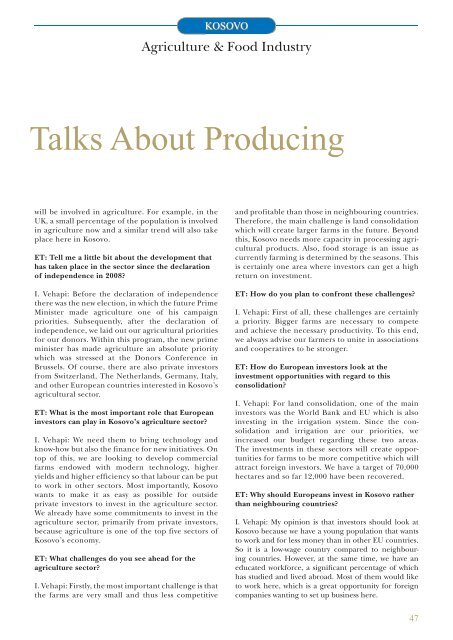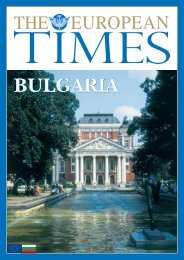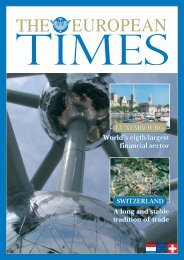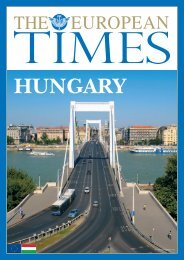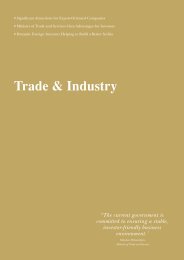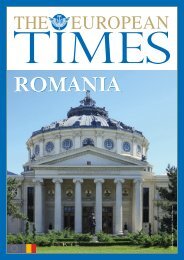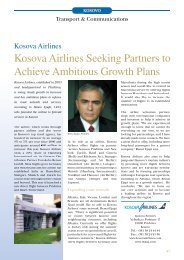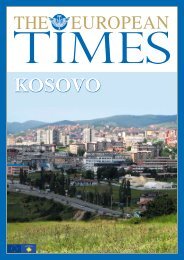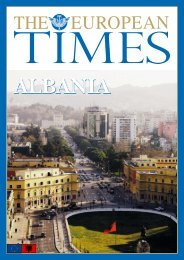KOSOVO - The European Times
KOSOVO - The European Times
KOSOVO - The European Times
- No tags were found...
Create successful ePaper yourself
Turn your PDF publications into a flip-book with our unique Google optimized e-Paper software.
<strong>KOSOVO</strong>Agriculture & Food IndustryTalks About Producingwill be involved in agriculture. For example, in theUK, a small percentage of the population is involvedin agriculture now and a similar trend will also takeplace here in Kosovo.ET: Tell me a little bit about the development thathas taken place in the sector since the declarationof independence in 2008?I. Vehapi: Before the declaration of independencethere was the new election, in which the future PrimeMinister made agriculture one of his campaignpriorities. Subsequently, after the declaration ofindependence, we laid out our agricultural prioritiesfor our donors. Within this program, the new primeminister has made agriculture an absolute prioritywhich was stressed at the Donors Conference inBrussels. Of course, there are also private investorsfrom Switzerland, <strong>The</strong> Netherlands, Germany, Italy,and other <strong>European</strong> countries interested in Kosovo’sagricultural sector.ET: What is the most important role that <strong>European</strong>investors can play in Kosovo’s agriculture sector?I. Vehapi: We need them to bring technology andknow-how but also the finance for new initiatives. Ontop of this, we are looking to develop commercialfarms endowed with modern technology, higheryields and higher efficiency so that labour can be putto work in other sectors. Most importantly, Kosovowants to make it as easy as possible for outsideprivate investors to invest in the agriculture sector.We already have some commitments to invest in theagriculture sector, primarily from private investors,because agriculture is one of the top five sectors ofKosovo’s economy.ET: What challenges do you see ahead for theagriculture sector?I. Vehapi: Firstly, the most important challenge is thatthe farms are very small and thus less competitiveand profitable than those in neighbouring countries.<strong>The</strong>refore, the main challenge is land consolidationwhich will create larger farms in the future. Beyondthis, Kosovo needs more capacity in processing agriculturalproducts. Also, food storage is an issue ascurrently farming is determined by the seasons. Thisis certainly one area where investors can get a highreturn on investment.ET: How do you plan to confront these challenges?I. Vehapi: First of all, these challenges are certainlya priority. Bigger farms are necessary to competeand achieve the necessary productivity. To this end,we always advise our farmers to unite in associationsand cooperatives to be stronger.ET: How do <strong>European</strong> investors look at theinvestment opportunities with regard to thisconsolidation?I. Vehapi: For land consolidation, one of the maininvestors was the World Bank and EU which is alsoinvesting in the irrigation system. Since the consolidationand irrigation are our priorities, weincreased our budget regarding these two areas.<strong>The</strong> investments in these sectors will create opportunitiesfor farms to be more competitive which willattract foreign investors. We have a target of 70,000hectares and so far 12,000 have been recovered.ET: Why should <strong>European</strong>s invest in Kosovo ratherthan neighbouring countries?I. Vehapi: My opinion is that investors should look atKosovo because we have a young population that wantsto work and for less money than in other EU countries.So it is a low-wage country compared to neighbouringcountries. However, at the same time, we have aneducated workforce, a significant percentage of whichhas studied and lived abroad. Most of them would liketo work here, which is a great opportunity for foreigncompanies wanting to set up business here.47


